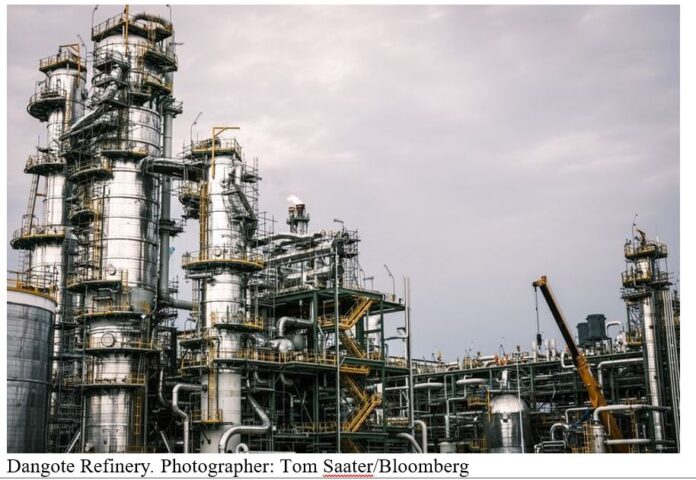Dangote Ref gushes enough to meet domestic consumption
By Jeph Ajobaju, Chief Copy Editor
Dangote Refinery in Lekki, Lagos is now primed to begin production by the third quarter of 2022 (Q3 2022), coming after several shifts in production date, but with assurance of gushing 540,000 barrels per day (bpd).
Its full capacity of 650,000 bpd output will meet domestic demand, save Nigeria 30 per cent foreign exchange (forex or FX) in refined fuel imports, and have surplus to ship abroad for additional hard currency.
Mechanical work on the refinery is complete and “hopefully before the end of third quarter we should be in the market,” Dangote Industries Chairman Aliko Dangote said at plant site.
It will take off with 540,000 bpd output and “full production can start maybe, by the end of the year or beginning of 2023,” he added.
The facility, which will cost an estimated $19 billion to build, has an installed capacity of 650,000 bpd, more than enough to meet Nigeria’s fuel demand and turn Africa’s largest crude producer into an exporter of refined crude.
__________________________________________________________________
Related articles:
Dangote Refinery, raising workforce to 57K, nears a spot in Africa’s top 5 entities
Dangote Refinery to hire 17,000 more workers. Raises total to 57,000
Despite shift in date, Dangote still plans to end Nigeria’s fuel imports
Navy agrees to protect Dangote’s $15b refinery
___________________________________________________________________
African manufacturing corps
Bloomberg reports that Dangote, Africa’s richest man – worth $20.4 billion – spoke along with Akinwumi Adesina, President of African Development Bank (AfDB) which has provided $300 million loan for the project.
Adesina said both men discussed possible collaboration to expand Dangote’s businesses to more African countries to benefit from the free trade area agreement.
They also talked about setting up an industrial manufacturing corps on the continent, comprising engineers who built the refinery, to ensure skills gained can be shared with other countries in Africa and elsewhere.
Dangote Refinery will save Nigeria 30% forex in imports
Central Bank of Nigeria (CBN) Governor Godwin Emefiele disclosed in October last year that full production by Dangote Refinery will save 30 per cent of forex the country spends on imports.
“Dangote Refinery once it begins production would be a major FX saving source for Nigeria.
“In Nigeria, from the FX we spend on imported items, importation of petroleum products consumes close to about 30 per cent.
“Dangote refinery has the capacity to produce 650,000 barrels per day of refined crude oil. If the 650,000 is sold in Naira it would be a major FX saver for Nigeria,” he said at a foreign investors’ meeting in New York, per Nairametrics reporting.
Emefiele explained that the project costs about $17.5 billion, with Dangote’s equity about $9 billion, and foreign and local banks and the CBN contributing $9 billion.
“That project is one of Nigeria’s backward integration programmes and we are very proud it is coming to light.
“Indeed we know that refineries abroad are already scared because they know the market they will lose because Nigerians will prefer to patronise that than foreign imported refined products where we will save [on] transportation and logistics.”
Emefiele said Nigeria could save about 40 per cent forex in imports through a combination of Dangote Refinery and a petrochemical plant that will be launched between June and July 2022.
He disclosed that when the project commences full operation, naira will be floated and will cease depreciation.
About Dangote Refinery
Dangote Refinery is a 650,000 bpd integrated refinery and petrochemical project owned by the Dangote Group. It will be Africa’s biggest oil refinery and the world’s biggest single-train facility when competed.
The cost of building it has been revised to $19 billion.
The refinery which will meet 100 per cent Nigeria’s refined petroleum product requirement and have surplus for export
The project has suffered several completion date setbacks especially due to the coronavirus pandemic which exposed worldwide vulnerabilities in supply chains, leading to delay in transporting some equipment to the refinery.













